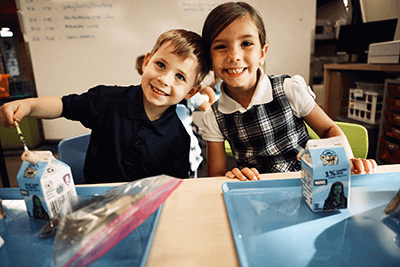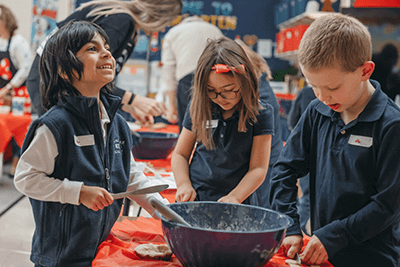November 25, 2024
 What makes a strong kindergarten program? How do you know what will be a good fit for your child? Should you find a program that focuses on academics, play, or one that promotes both? Is a public elementary school the right choice or a private one with smaller kindergarten class sizes?
What makes a strong kindergarten program? How do you know what will be a good fit for your child? Should you find a program that focuses on academics, play, or one that promotes both? Is a public elementary school the right choice or a private one with smaller kindergarten class sizes?
There is no one-size-fits-all answer. Every family needs to base their kindergarten decision on what works best for their individual circumstances and values. Given our experience at Mounds Park Academy, a private PreK-12 school in Saint Paul, Minnesota, we believe that you can determine whether a kindergarten program is strong by asking yourself the following questions.
Is it joyful?
Kindergarten is a magical time in early childhood development. Our teachers, administrators, parents, and students all use the word “joy” when describing kindergarten at MPA. Students should be happy about being at school and excited to come home and share the news of their day. When you visit a kindergarten classroom, a sense of joy should exude from it because children are active, engaged, and having fun.
Is it creative?
Kindergartners should be doing projects, not worksheets. Strong kindergarten programs will have students engaged in creative projects that bring together emerging skills like writing, language skills, critical thinking, drawing, and reading. Exceptional kindergarten programs will use an interdisciplinary approach as students build their foundational academic skills. At MPA, we believe educational experiences are more authentic and of greater value when students learn through an interdisciplinary, hands-on approach–even in kindergarten. Specialist classes like music, art, physical education, and world language supplement students’ educations, developing well-rounded individuals and fostering creativity and critical thinking. Kindergarteners at MPA also often venture outdoors for learning and exploration, which promotes physical activity and environmental awareness.
Is it collaborative?
Kindergarten programs that promote collaboration at all levels are strong. This means collaboration in terms of student-to-student, student-to-teacher, and teacher-to-parent. Children should be learning how to get along and work with their peers from all backgrounds through collaboration and learning together. When you visit a kindergarten classroom, observe whether (and how well) the students are interacting with each other as well as with their teacher. Also ask how kindergarten teachers collaborate with parents to ensure clear communication, common goals, and deep, mutual understanding.
Is it safe?
MPA places a high value on community-building and developing strong relationships within the school. With its small class sizes, MPA’s Kindergarten offers a student-to-teacher ratio that allows more individualized attention to each student. This enables teachers to better understand each child’s learning style, interests, and needs, ensuring that every child receives the support they need to thrive. In this safe and supportive environment, students learn important social emotional skills like empathy, self-regulation, and communication. Teachers support students as they navigate group dynamics, conflict resolution, and building relationships, fostering a caring and inclusive community. Additionally, young learners at MPA not only interact with their kindergarten peers but also with older students, teachers, and staff in meaningful ways. This inclusive, supportive environment helps children feel connected and valued, which can boost confidence and engagement in their learning.
 Do students thrive?
Do students thrive?
A successful love for learning stems from joyful classrooms. When kindergartners are engaged and having fun, learning becomes an exciting challenge for them. Strong kindergarten programs sprout this love of learning and cultivate it throughout the year, building upon children’s wonder and curiosity. When considering a kindergarten program, you should ask how teachers approach different learning styles and abilities, as well as differences in social and emotional development. In kindergarten, this varies widely, and it is critical for all students to have a positive experience no matter where they start. MPA teachers are aware of their students’ strengths, opportunities for growth, and interests and strive to help them become the best versions of themselves.
When researching kindergarten options, make sure to also ask yourself, “Would I want to spend a day here?” We find at MPA that many parents remark that they’d love to relive kindergarten if they could go to MPA. Kindergartners learn by doing, and in our classrooms, the children are always actively participating, sharing ideas, working together, having fun, and exuding pure joy.
If it sounds like Mounds Park Academy may be the right kindergarten for your family, we encourage you to begin the admission process and register for one of our upcoming Mini K Admission Days! Parents will connect with administrators and each other while prospective kindergarteners participate in engaging and hands-on activities in the Makerspace. Children will interact with peers and get a taste of what it would be like to be a kindergartener at MPA. Additionally, our faculty and staff will have the chance to engage with each child in a kindergarten classroom setting and assess their school readiness. As a requirement of the kindergarten application process, registration for the Mini K Admission Days is available in Ravenna, once a family has submitted a kindergarten application.
The upcoming Mini K Days are:
- December 18, 8:30-9:30 AM
- January 10, 4-5 PM
- February 5, 8:30-9:30 AM
- February 13, 8:30-9:30 AM
Please connect with the Office of Admission at admission@moundsparkacademy.org if you have any questions!